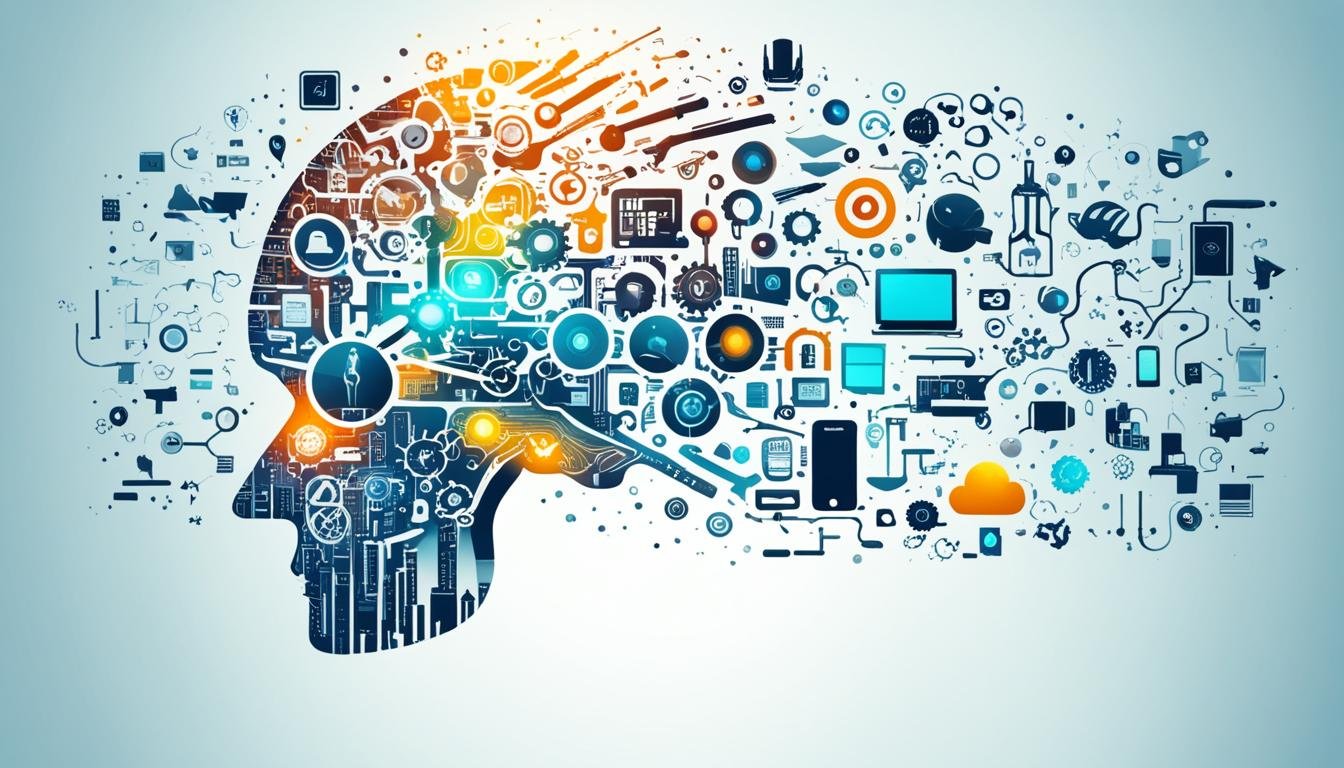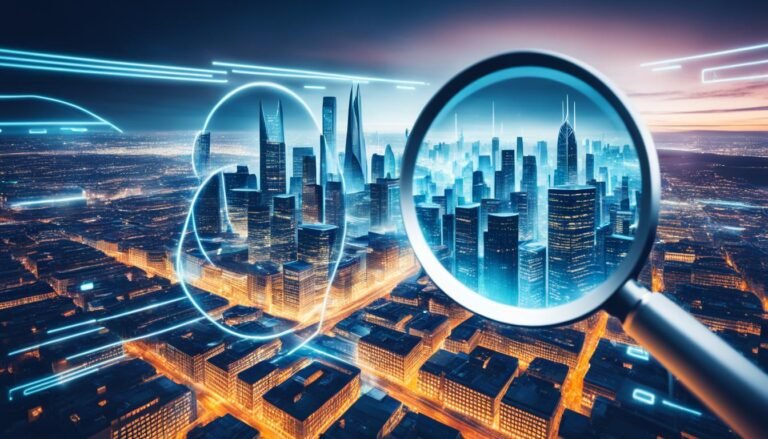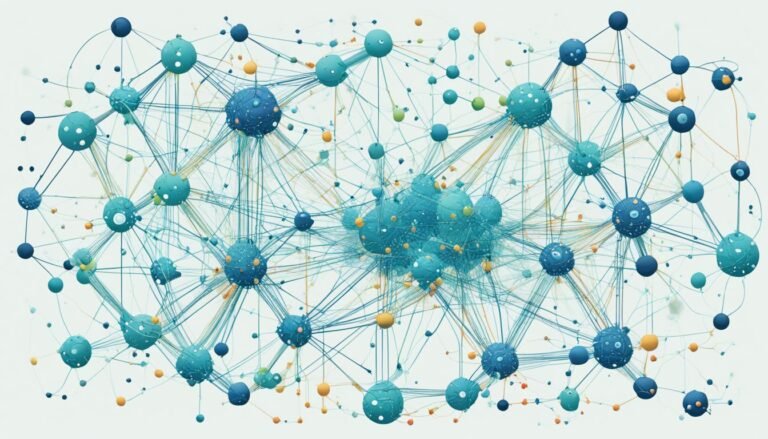AI vs. Human Intelligence: Complementary or Competitive?
What if our journey forward doesn’t have to choose between artificial intelligence (AI) and what makes us human? But, instead, it’s about bringing the two together in harmony?
The world is changing fast, with technology growing daily. Major talks focus on how AI and our intelligence can work together or if they might clash. This ongoing discussion looks at how AI can help us do more but also raises concerns, such as losing control and ethical problems. Now, we stand at a big decision point. We have to choose how to use AI wisely to make our lives and society better.
We need to find a middle ground. AI is great for quick data processing and expanding what we can do. On the other hand, we humans have special things too, like emotions and creativity, which are way beyond what AI can offer right now. Our goal is to look at how mixing human and AI thinking can lead to a future that’s beneficial for both.
Key Takeaways
- The artificial intelligence debate focuses on whether AI and human intelligence should complement or compete with each other.
- AI excels at specific narrow tasks with superior data processing speed, accuracy, and scalability.
- Humans possess unique cognitive abilities, including empathy, creativity, and a nuanced understanding of complex problems.
- A symbiotic relationship between AI and human intelligence could enhance both creative and analytical processes.
- Ethical considerations are paramount in ensuring AI complements human goals and values.
Understanding Artificial Intelligence
Artificial Intelligence (AI) has become a game-changer by redefining how businesses work. It shows up more and more in our daily routines. To grasp AI’s impact, it’s key to explore its meaning, how it works, and the many ways it helps different fields.
Definition and Scope
AI mimics how humans think, learn, and solve problems. It includes a variety of technologies that act smart without human help. AI shines in analyzing lots of data and making smart choices better and faster than we can. It gets smarter on its own, improving all the time.
Core Technologies
Machine learning and cognitive computing are at the heart of AI. Machine learning teaches AI to get better at tasks by learning from data. Meanwhile, cognitive computing aims to make AI think more like us. This makes AI useful in many scenarios, from quick decisions to thoughtful choices.
Applications in Various Industries
AI is changing how we work across many fields. It boosts healthcare by spotting diseases in images or predicting issues before they occur. In transportation, it makes self-driving cars smarter by handling information quickly. AI also fights fraud in finance and improves how shops connect with customers. Using AI, businesses are pushing the boundaries of what they can do.
As AI keeps growing with the help of machine learning and cognitive computing, it’s reshaping our world. Learning about its basics shows us how much AI can do to help us make better choices and work together with machines.
Human Intelligence: Our Innate Abilities
Human intelligence is vast, combining many cognitive skills with emotional and creative abilities. These talents help us in social situations, problem-solving, and forming close bonds. These are key for doing well in life and at work.
Cognitive Skills
Cognitive skills are rooted in our brain’s information processing. This lets us learn, think critically, and adapt. Humans excel where AI doesn’t, especially in making decisions that need a mix of logic and gut feeling.
Emotional and Social Intelligence
Our emotional intelligence allows us to understand and handle emotions well. It’s vital for strong personal and work relationships. Only a fifth of leaders are strong in this area, showing we need to improve. AI can’t match our empathy and emotional insight necessary for leading and working well together.
Creativity and Innovation
Creativity powers our innovation in various fields. Our ability to think of new ideas and solve problems is unmatched. Although AI is making advances, it can’t replicate our unique creative process that draws from our emotions and experiences. So, human creativity remains invaluable.
AI vs. Human Intelligence: Complementary or Competitive?
Some say artificial intelligence (AI) and human intelligence work together, while others see them as rivals. A study by MIT Sloan shows that many organizations think AI will help them beat the competition. It’s expected that more groups will use AI, with a growth of 37.3% each year from 2023 to 2030.
AI shines in tasks like analyzing data and spotting patterns, making decisions faster. But, ethical AI development is crucial to ensure harmony between AI and people. People can think, adapt, and create in ways that machines can’t yet. Human intelligence includes deep wisdom from life experiences and emotional understanding, things AI finds hard.
The growing use of AI is creating new jobs like data science and AI ethics roles. This shows AI and human skills can work together well. It’s not just about competing. AI supports human work in healthcare, finance, and more. For example, in health, it helps with finding diseases. Unlike the human brain that needs more power, AI systems are efficient, using less energy.
In transport, AI is in self-driving cars and making travel routes better. But, human qualities like being creative and making wise choices add real value to our work. Combining AI with human thinking and ethical decisions is key. This creates a future where AI and humans boost each other’s abilities for the greater good.
“The coexistence of AI and human intelligence is vital for fostering progress and innovation in various fields.”
Keeping AI and human intelligence in sync requires constant training. Online courses can help people prepare for a future where AI is common. Not many leaders show strong emotional skills, which is key for aligning AI goals with human needs. The AI and human intelligence journey is not a battle but a joint growth. This partnership opens new doors, making progress that is good for everyone.
Speed and Efficiency in Problem-Solving
AI has changed how quickly we solve problems. It’s especially good at handling a lot of data fast. Many fields, like healthcare and finance, are using this to their advantage. They can now make better decisions in less time.
AI’s Data Processing Capabilities
AI is great at working with big data. It can look at and understand huge amounts of information very quickly. This is super useful for things like checking the stock market in real-time or helping with a medical diagnosis right away.
Yet, AI isn’t perfect. It might struggle to understand things like common sense the way we do. Human skills, like understanding context and emotional intelligence, are still very important. Together, AI and human abilities can solve problems faster and in smarter ways.
Human Analytical Abilities
People have a lot to add to problem-solving that AI can’t. Our ability to deeply understand situations, emotions, and be creative is crucial. This includes things that go beyond just the numbers, like empathy and creativity.
Our quick adaptability and rich experiences are key. And they ensure we think broadly and ethically in solving issues. By working alongside AI, we can make groundbreaking improvements for everyone.
Adaptability and Learning
Human adaptability and AI machine learning work quite differently. Humans can adjust to changing environments because they rely on past experiences and gut feelings. This flexibility lets them face unpredictable scenarios with creativity and an open mind.
On the flip side, AI excels in doing the same tasks over and over. It gets better through a lot of training and data. But, AI might struggle with completely new things since it can only learn what it’s already been taught.
Even with how advanced AI is, it’s not great at understanding human experiences and common sense. These are areas where people shine. So, AI often works alongside humans, not in place of them. Together, they can solve problems way better than each could on their own.
When AI and humans work together, the combo is powerful. Humans bring their adaptability and deep understanding. AI kicks in with its super-fast info processing. Together, they can handle the surprise of changing environments and unpredictable scenarios. This teamwork pushes innovation further.
Empathy and Emotional Intelligence
In today’s fast-paced world, human empathy and emotional intelligence are more important than ever. They are unique qualities we possess. While machines can crunch data at lightning speed, humans are unbeatable at bonding and understanding each other. These abilities are key to true emotional connections and great leadership.
The Uniqueness of Human Emotions
Feelings make us who we are. They let us make lasting friendships and understand others. Our emotional insight goes deeper than just recognizing feelings. It’s about truly feeling and understanding complex emotions. This helps in building strong communities and leading effectively.
AI’s Limitations in Emotional Understanding
With all its progress, AI can’t feel emotions like we do. It can sort emotions by data but not feel them. This means it can’t truly empathize. Human emotional intelligence is key, especially in leading and bringing people together. AI and human empathy work best together, each offering something unique.
Creativity and Innovation: Human vs. Machine
Creativity and innovation happen in special ways, both for humans and AI. Human ingenuity, with its deep imagination and feelings, stands out. It outshines AI in creating new ideas, especially in art, science, and technology.
Our creativity is far beyond what AI can do in art, music, and books. Our deep emotions and ability to adapt help us create as the world changes. Even with AI’s growth, it can’t take over the unique ways humans innovate and improve society.
AI-Driven Art and Music
AI creates art using complex rules to make something new. This shows AI’s power in handling a lot of data and always learning. Yet, it misses the human touch and deep understanding of feelings. The goal is to combine AI’s strengths with our creativity. This would help both work better together, aiming for efficient operations and innovation that keeps people at the center.
Comparing human vs. AI creativity lets us see the strong points of each. As we move forward, the future of creativity and innovation is in combining these. Working together, AI and humans can create a more dynamic and advanced creative world. This all happens by using the best of both sides.
Ethics and Moral Decision-Making
Artificial intelligence is now deeply involved in our lives, making the discussion about ethics in AI critical. Machines process information quickly but this brings up ethical questions. Unlike people, AI doesn’t use morals to make choices. This makes it crucial to add human values into AI. By doing this, AI can make decisions that are good for society and based on important values.
Humans have skills like being adaptable and showing empathy. These skills are key for making good ethical choices, especially in complex, unpredictable situations. AI can’t fully understand emotions, so it lacks the ability to make subtle ethical judgments. Humans and AI should work together. AI can handle basic tasks while humans focus on the most complex ethical issues. Human creativity and understanding of society complement AI’s logical approach.
A report by MIT says 87% of global companies see AI as a way to get ahead. So, AI is going to be used more. But, it’s very important to use AI responsibly. Teaching people about AI ethics is a crucial step. This helps avoid the negative impacts AI might have on society. A close collaboration between humans and AI, focusing on ethical values, is the best way forward. This ensures that the relationship between AI and humanity is beneficial to all.
Source Links
- https://medium.com/@picturesqueen01/ai-versus-human-intelligence-complementary-partners-or-competitive-adversaries-24c18b3feda0
- https://www.linkedin.com/pulse/ai-vs-human-intelligence-competition-collaboration-pixcap-s9gjc
- https://medium.com/@asiripiyajanaka/human-vs-ai-the-ultimate-showdown-who-claims-victory-cf94e59fe9a2
- https://autogpt.net/artificial-intelligence-vs-human-intelligence/
- https://www.velosio.com/blog/combining-ai-and-human-intelligence-adding-value-in-the-age-of-automation-and-ai/
- https://indiaonline.sandiego.edu/news/ai-vs-human-intelligence-future-challenges-and-opportunities
- https://www.linkedin.com/pulse/ai-vs-human-intelligence-comparative-analysis-piyush-goyar
- https://www.jobsbuster.com/artificial-intelligence-vs-human-intelligence-a-deep-analysis/
- https://www.upgrad.com/blog/ai-vs-human-intelligence/








